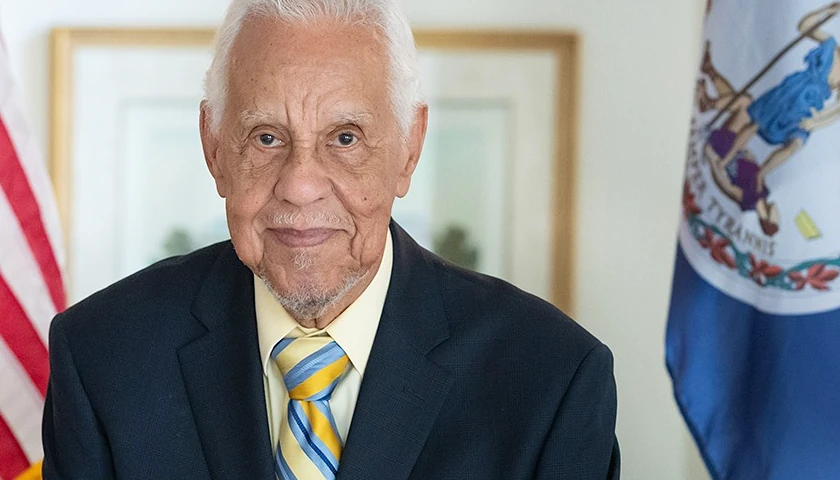Bills to repeal Virginia’s same-sex marriage prohibition have passed in both legislative chambers with bi-partisan support this week. HJ 582, introduced by Delegate Mark Sickles (D-Franconia) and SJ 270, introduced by Senator Adam Ebbin (D-Alexandria) seek to amend language in the state constitution passed in 2006 saying that marriage is between one man and one woman.
“For several years now, I have introduced this resolution because I know millions of people want to either take back their vote that they made in 2006 or they weren’t old enough to vote in 2006 and want to weigh in on this,” Sickles said in subcommittee.
“It’s an affirmative right that agents of the commonwealth shall issue marriage licenses and recognize marriages and treat all marriages equally under the law,” he said. “This is not forcing a religious organization to perform any type of religious service that is against their conscience and what they don’t believe.”
Sickles’ proposed amendment states, “That the right to marry is a fundamental right, inherent in the liberty of persons, and marriage is one of the vital personal rights essential to the orderly pursuit of happiness. This Commonwealth and its political subdivisions and agents shall issue marriage licenses, recognize marriages, and treat all marriages equally under the law regardless of the sex or gender of the parties to the marriage.”
Another clause clarifies, “Religious organizations and clergy acting in their religious capacity shall have the right to refuse to perform any marriage.”
Amendments to Virginia’s Constitution require passage in two General Assembly sessions with a general election held in between. Then, the amendment goes to the public for a vote. As a result, the amendment still faces a relatively high hurdle before the commonwealth’s Constitution is changed.
Current language in the Constitution banning same-sex marriage is already effectively dead.
The Constitution states in part, “That only a union between one man and one woman may be a marriage valid in or recognized by this Commonwealth and its political subdivisions.”
That language is the result of the Marshall-Newman constitutional amendment banning same-sex marriage, which was ratified in 2006 by a 57.06 percent general election vote. In 2014, Eastern District Court Judge Arenda Wright Allen found the Marshall-Newman amendment to be unconstitutional in Bostic v. Shaeffer.
Wright Allen wrote, “The Court is compelled to conclude that Virginia’s Marriage Laws unconstitutionally deny Virginia’s gay and lesbian citizens the fundamental freedom to choose to marry. Government interests in perpetuating traditions, shielding state matters from federal interference, and favoring one model of parenting over others must yield to this country’s cherished protections that ensure the exercise of the private choices of the individual citizen regarding love and family.”
The decision was appealed and upheld in the Fourth Circuit Court of Appeals. The U.S. Supreme Court declined to overturn the decision in 2014, effectively legalizing same-sex marriage in the Commonwealth. In 2015, the Supreme Court’s decision in Obergefell v. Hodges outlawed similar same-sex marriage bans across the country.
However, due in part to the difficulty of enacting amendments in Virginia, an unenforceable ban on same-sex marriage still exists in Virginia’s Constitution.
“We have a rare chance for a do-over when we got it wrong with our message,” Ebbin said on the Senate floor on Friday. “Here we are six years later and we have a chance to make our constitution accurate in terms of the operative laws of this country and this commonwealth.”
Senate Minority Leader Thomas Norment (R-James City) said he was concerned about the large number of constitutional amendments being considered by the General Assembly.
“I recognize that times change,” he said. “I recognize that Virginia has changed and I recognize that there is a new cadre of legislators who have a different perspective on what the policies of the commonwealth should be.”
Norment continued, “We have seven constitutional amendments being proposed this year. Seven. And I realize that some of them are laudable and some need to be done, but this really is just bordering on absurdity.”
Family Foundation President Victoria Cobb said the proposed bills go beyond removing a same-sex marriage ban.
“These resolutions would not only remove this language from the constitution, but also seek to replace it with language to officially recognize all so-called marriages ‘regardless of the sex or gender of the parties to the marriage,'” Cobb wrote in a recent email blast.
“While both bills specify that religious organizations and clergy may refuse to perform any marriage (a right they already clearly have), they still attempt to redefine marriage outside of what God has designed for human flourishing, which also entails the critical ideal of raising children by both their mom and dad who love each other,” she said.
Cobb added, “Unfortunately, as expected, all of society, including those whose deeply held convictions have not moved with secular society are uniformly expected to not only abide those with differing views on marriage but embrace them in their speech and celebrate them in their business life.”
– – –
Eric Burk is a reporter at The Virginia Star and the Star News Digital Network. Email tips to [email protected].




